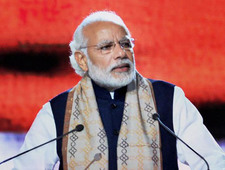
WASHINGTON,D.C.-U.S. President Barack Obama will meet with Indian Prime Minister Narendra Modi here in June to discuss security and other issues and the Indian leader will be granted the rare honor of addressing both houses of Congress. The White House said Obama and Modi will discuss economic growth, climate change, clean energy, and security and defense cooperation during their June 7 meeting.

It will be Modi’s fourth trip to the United States since he became prime minister in 2014. “The visit will highlight the deepening of the U.S.-India relationship in key areas,” the White House said. The two countries’ partnership is seen as critical in Washington, which is seeking to counterbalance China’s increasing power.
Modi will address a joint meeting of the U.S. Congress, an opportunity extended to few foreign leaders, the day after the White House meeting, U.S. House Speaker Paul Ryan said in a tweet.
The invitation is a sharp turnaround for Modi, who was once barred from the United States over massacres of Muslims. Last year there were only two joint addresses to Congress - by Pope Francis and by Japanese Prime Minister Shinzo Abe, another important U.S. ally in Asia. The United States is also keen to encourage greater business and trade with India. Progress has been only gradual, but in late March, the chief executive of U.S. nuclear reactor maker Westinghouse Electric said he expected to sign a deal in June to build six reactors in India after marathon negotiations that began more than a decade ago. The deal would be the first nuclear commercial power project since the United States and India agreed in 2008 to cooperate in the civil nuclear arena.
Modi will address a joint meeting of the U.S. Congress, an opportunity extended to few foreign leaders, the day after the White House meeting, U.S. House Speaker Paul Ryan said in a tweet.
The invitation is a sharp turnaround for Modi, who was once barred from the United States over massacres of Muslims. Last year there were only two joint addresses to Congress - by Pope Francis and by Japanese Prime Minister Shinzo Abe, another important U.S. ally in Asia. The United States is also keen to encourage greater business and trade with India. Progress has been only gradual, but in late March, the chief executive of U.S. nuclear reactor maker Westinghouse Electric said he expected to sign a deal in June to build six reactors in India after marathon negotiations that began more than a decade ago. The deal would be the first nuclear commercial power project since the United States and India agreed in 2008 to cooperate in the civil nuclear arena.

 RSS Feed
RSS Feed
